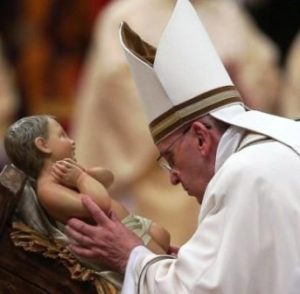US President elect Donald Trump thinks he’s ‘won the war against Christmas’, but Journalist Christopher hale has something more to say:
Unfortunately for O’Reilly and Trump, there’s still one person they must defeat in this self-perpetuating war on Christmas. It’s Pope Francis, the 80-year-old leader of 1.2 billion Catholics across the globe.
“Christmas is a charade!” Francis said last year.

These aren’t exactly words you would expect from a Christian during the holiday season, much less the pope. But that’s exactly what the troublemaker Pope Francis told a group of us gathered for Mass in 2015. “Christmas is approaching: There will be lights, parties, lighted Christmas trees and manger scenes. … It’s all a charade.”
Why would the pope wage war on Christmas? “The world continues to go to war. The world has not chosen a peaceful path. There are wars today everywhere, and hate,” Francis said. “We should ask for the grace to weep for this world, which does not recognize the path to peace. To weep for those who live for war and have the cynicism to deny it. God weeps; Jesus weeps.”
In other words, the meaning of Christmas isn’t strength and visibility in the public sphere. The central claim of this holiday has always been that the rejected, crucified and executed Jesus Christ is still somehow Lord of the entire earth. In Trump’s world, those like Jesus Christ are the losers. In God’s world, these are the victors.
The power of Christmas is derived from our ability to communicate and practice God’s saving love in the invisible parts of the world. Saying “Merry Christmas” at Macy’s might win an empty-shell public-relations battle, but it does nothing to truly advance the Gospel of Jesus. The Christmas that Donald Trump is defending is the Norman Rockwell Christmas: a bourgeois celebration that’s accented by turkey, gifts and comfort. From a Christian standpoint, then, Pope Francis is right: This version of Christmas is a charade, and it’s time to reignite the war against it.
If we shouldn’t aim to elevate the domesticated, bourgeois notion of Christmas and signal a return to Christian cultural dominance, then what is Christmas really all about? In short, it’s about the opposite of what Trump thinks it is: Reaching out to the excluded and downtrodden, and humbling ourselves before others.
In the time of Jesus’ birth, the expectation of a messiah was strong among the Jewish people. They were looking for a hero who would at last set their people free from every form of moral, political and economic slavery they faced under the tyranny of Rome. The prophet Isaiah told them this liberator would “beat spears and swords into plowshares and pruning hooks” and end the scandal of war.
Yet God didn’t send a military leader or a politician to save his people, but a child born to an unwed mother, who even fled violence as a refugee. This child did indeed bring liberation, but not just for the people of that time and place. He was to be a savior for all of humanity and for every age, destroying death forever and restoring life through the means of a shameful death upon the cross. No one would have expected the messiah to be born in poverty, obscurity and exclusion, far from the cultural and political centers of the world — but such is God’s logic.
In this framework, the last are first, the poor are blessed, enemies are loved and strangers are welcomed. Black lives matter here. LGBT lives matter here. And so, too, do the lives of women, refugees, the imprisoned, the unborn and anyone else who suffers exclusion.
But Jesus doesn’t just come for the excluded. He comes, too, for the parts of our own lives that are suffering. In Jesus, Pope Francis says, God “assumed our frailty, our suffering, our anxieties, our desires and our limitations. … He accepts our poverty, God who is in love with our smallness.”
If Pope Francis is right, these are the sentiments that should highlight our Christmas celebrations this year. Francis argues that the Christmas story “asks us to risk a face-to-face encounter with others, with their physical presence which challenges us, with their pain and their pleas, with their joy which infects us in our close and continuous interaction. True faith in the incarnate Son of God is inseparable from self-giving, from membership in the community, from service, from reconciliation with others.”
At Christmas, Jesus came all the way down into the grittiness of human dysfunction — its violence, its disloyalty and its sinfulness — to bring everyone up. The very essence of the holiday calls us out of our comfort and into discomfort.
In Jesus’ birth and in his story, we can begin to understand Christmas for what it really is: God’s invitation to a revolution of tenderness.
[Christopher Hale, a columnist for TIME on faith, is the executive director of Catholics in Alliance for the Common Good and the co-founder of Millennial. He helped lead national Catholic outreach for President Obama’s 2012 re-election.]


